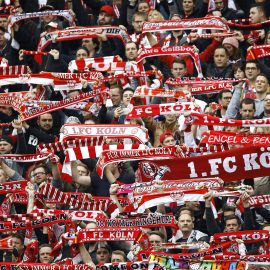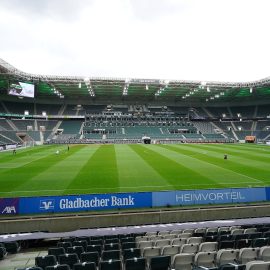There seems to be the general consensus in the world of football today that football clubs in general have never been stronger in this dreadful economy. Companies like Sky and Setanta are paying a king’s ransom for viewing rights, while current players complain when their weekly contracts are less than £80,000-a-week. Whilst most of the big clubs have more than enough money to see themselves through the storm, there’s still a slight chance that could change if clubs continue to spend money like it’s going out of style.
As we all learn to adapt in these terrible times of recession, sooner or later a large football club could surely find itself looking into the abyss with the spiraling wage bills, combined with a lack of people coming through the turnstiles and wonder if they’ll be able to see themselves through the storm. If you need a good example of a great club in trouble you needn’t look any further than Valencia’s great demise.
That’s why as a football supporter I am being drawn more and more to the most spectator friendly league in Europe — Germany’s Bundesliga. Though television companies are constantly singing the praises of the Premier League, attendances are dropping with prices at clubs such as Chelsea and Tottenham hitting over £250 for a family of four. When you factor in transportation costs as well as the entertainment or lack thereof of the actual match, you all but price yourself out of every attending a match.
For the Bundesliga – where football really did come home after producing the most successful World Cup of all time in 2006 – its popularity has been increasing with the powers that be realising that the most important people in the game are the supporters themselves rather than the pampered £150,000 a week players. The average attendance for a Bundesliga match in 2008 was 40,880 compared to the 35,269 in the Premier League; the atmosphere is second to none with supporters having the option to stand on the terraces and have their beer topped up for you from the numerous vendors dotted around — plus there’s not a prawn sandwich to be seen.
So I’m sure you’re wondering why I’d rather travel to Germany to watch a game than save my hard-earned pennies and stay closer to home? Let’s start with the geography — no fewer than six top flight clubs: Borussia Dortmund, Borussia Monchengladbach, VFL Bochum, Schalke 04, Bayer Leverkusen and 1.FC Koln are located within 4 hours of Calais. That’s not too bad when you consider people drive similar hours each weekend to see their club play.
Then of course there’s the German efficiency which makes it simpler and of course cheaper to attend a match. The average prices for the Bundesliga is only 19 Euros, and if you are fortunate enough to find yourselves on the hallowed Sud Tribune of Borussia Dortmund as I was recently (the biggest terrace in the world holding 30,000 swaying souls), it will cost you approximately 10 euros (cheaper than my local non-league side) for an atmosphere of singing and dancing, as well as the obligatory filling up of beer from the vendors for just a euro.
It is all about creating an atmosphere and an ambiance that will continue to grow with future generations as it is seen to be cool to go to football matches in Germany. Transportation to the ground and back is all free and comes with the price of your ticket you purchased, therefore making the overall event extremely reasonable.
Put it this way: When I wanted a ticket for a Fulham match where I would have to become a member at considerable cost before being able to buy a ticket, it seemed to put everything into perspective. When you add in the travel cost of getting up to London from my home in deepest Kent plus the ticket, it turned a questionable decision into an impossible one.
The football on show in the Bundesliga is also more exciting, and though admittedly the best players in the world are not drawn to it due to the wages, the league is the most exciting in Europe with no fewer than five teams being separated by 4 points at the top compared to a division which is basically done and dusted by the end of February. You can see why people are finding the propaganda from the media that the Premier League is the most exciting league in the world a bitter pill to swallow.
Football is about the fans and what they can deliver to the experience, and having spoken to German fans while at the games, they are amazed that I travel to watch their sides instead of the so called big four in the UK. I give them the same answer each time: I come to the matches each time because the clubs make you feel like you’re part of something bigger. You never feel that at most clubs in the Premier League. In the end people yearn for that kind of thing, and that’s why you can count me among the rare few that have changed my allegiance to a far superior product.
Matthew Gerrard is a former Premiership supporter who now spends his time (when he can) on the Süd Tribune at Borussia Dortmund.
Add Sportslens to your Google News Feed!






